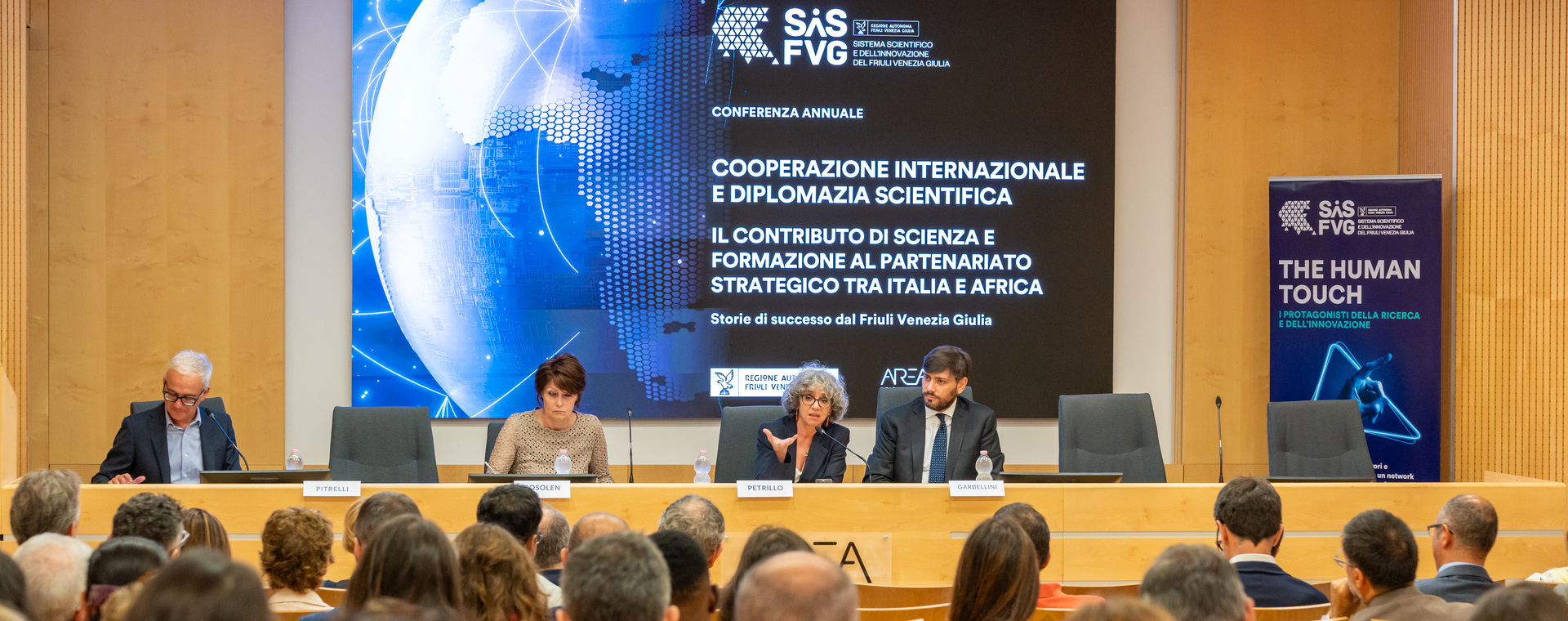05/07/2024
Friuli Venezia Giulia is a point of reference for international cooperation and Italy/Africa scientific diplomacy through its Scientific and Innovation System
The contribution to science and training by SiS FVG institutions in the development of the strategic partnership
Innovazione
Science and training can effectively contribute to developing the strategic partnership between Italy and Africa, also in light of the new Mattei Plan for Africa promoted by the Presidency of the Council of Ministers. This is demonstrated by Friuli Venezia Giulia, which, with the significant amount of experience gained and success stories, can play a central role in deepening the already fruitful collaborations. This is what emerged from the annual conference of SiS FVG, the Scientific and Innovation System of Friuli Venezia Giulia, held on Wednesday, 26 June, at Trieste’s Area Science Park and which explored the connections between international cooperation and scientific diplomacy.
“The Scientific and Innovation System of Friuli Venezia Giulia has anticipated many of the topics in the Mattei Plan. The very topic of scientific diplomacy has gone hand in hand with the history of this territory, anticipating the debate we are facing at a national and European level”, declared Alessia Rosolen, Councilor for work, training, education, research, university and family of the Autonomous Region of Friuli Venezia Giulia. “Our added value has concerned, in particular, the training courses in support of research, in the relationship between new professional figures, in the construction of the higher education system and ITS (Higher Technical Institutes). In this area, among other things, we have two national excellences:
The exchange programme of the “Malignani” Institute of Udine with Egypt and that of ITS “Alto Adriatico” of Pordenone with Ghana.
During the conference, there were talks by numerous speakers, making contributions to and discussing the topic. Among these, Vincenzo Lorusso, in charge of the European Union’s Cooperation in Research and Innovation with the African Union at the Directorate-General for Research and Innovation of the European Commission, spoke about the key role that Research & Innovation have in the development of the partnership between the European Union and Africa. Lorusso also confirmed the investment (equal to 150 billion euros), announced at the EU-AU summit last February, aiming to support Africa for a strong, inclusive, ecological and digital recovery and transformation.
The role of science as an effective tool for consolidating transnational relations was already reiterated in the 2019 Trieste Declaration, signed by the ministers of 17 countries of the Central European Initiative (CEI), who designated as priorities themes such as scientific diplomacy, the mobility of researchers, the exchange of staff, and the promotion of transnational collaborative networks.
Among the best practices presented are the MITS Academy/Egypt project and Alto Adriatico Confindustria’s training project with Ghana. The former, stemming from the collaboration between the ITS Academy of Udine and the Istituto Paritario Don Bosco of Cairo, and illustrated by Paola Perabò, Vice President of the MITS Malignani Istituto Tecnico Superiore Foundation of Udine, aims at reducing the misalignment between supply and demand of qualified personnel in the manufacturing sector and promoting cooperation between Italy and Egypt. The latter, presented by the President of the Alto Adriatico Confindustria, Michelangelo Agrusti, has the objective of training young Ghanaians, already enrolled in technical and professional schools in that country, to fill the labour shortage in the industrial system of Friuli Venezia Giulia.
The President of Area Science Park, Caterina Petrillo, opened the meeting, focusing on the strategic importance of the topic of the Conference, shared by all the representatives of SiS FVG, “a fundamental theme for Trieste, a centre of excellence where numerous entities were created and operate and are active in research and higher education at an international level”. The President then remembered the G7 Research event on 2 October, organised in the context of the BSBF 2024, devoted to building skills and transferring knowledge in order to strengthen collaboration between Italy and Africa.
Alessandro Garbellini – Office Manager of the Space, Multilateral Scientific Cooperation and Intellectual Property Department of the Ministry of Foreign Affairs and International Cooperation, then spoke, and affirmed: “The SiS FVG model certainly represents a lever for our foreign policy and is proof of how much a functioning infrastructure combined with proactivity of the institutions brings benefits to the nation’s system. Trieste has invented a new model of scientific cooperation: pooling skills, allowing access and ensuring that brains produce regardless of their origin. The Ministry is promoting the Trieste model around the world.”
This was followed by a speech by Francesco Ciardiello, of the Technical Administrative Office of the General Directorate of Research at the Ministry of University and Research, who reiterated Trieste’s central position and the role that it can play in the development of international cooperation.
The final part of the conference was dedicated to a round table moderated by Nico Pitrelli, director of the Master’s Programme in Science Communication of the “Franco Prattico” SISSA. The discussion focused on cases of scientific cooperation and diplomacy presented by various institutions of the SiS FVG.
Speakers: Alessandro Lombardo, Senior Executive Officer CEI – Central European Initiative; Marianna Maculan, External Relations Manager for ICGEB – International Center for Genetic Engineering and Biotechnology; Atish Dabholkar, Director of ICTP – International Centre for Theoretical Physics; Tonya Blowers, Programme Coordinator of OWSD – Organization for Women in Science for the Developing World; Claudia Baracchini, Senior Project Manager of TEC4I FVG – Technologies for innovation FVG; Peter Mc Grath, Coordinator of the Scientific Diplomacy Unit for TWAS – The World Academy of Sciences; Mounir Ghribi – Director of International Cooperation and Research Promotion for OGS – National Institute of Oceanography and Experimental Geophysics.
Councilor Rosolen concluded the work.
SiS FVG is an initiative of the Autonomous Region of Friuli Venezia Giulia, in collaboration with the Ministry of Foreign Affairs and International Cooperation and the Ministry of University and Research, to enhance the Scientific and Innovation System of Friuli Venezia Giulia.